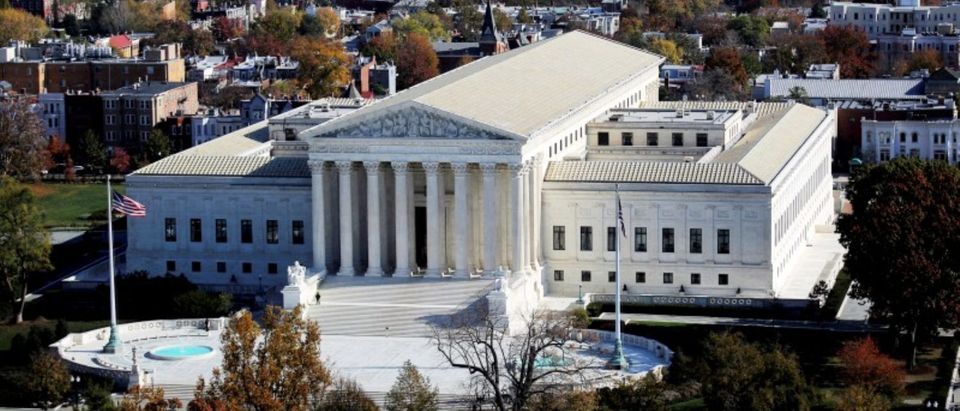New Jersey Sen. Bob Menendez didn’t thank the U.S. Supreme Court when he addressed reporters Thursday after escaping conviction on federal corruption charges, though he is very much in their debt.
The embattled Democrat faced a lengthy indictment featuring 18 charges for bribery, honest services fraud, conspiracy, traveling over state lines to carry out bribery, and making false statements on federally-mandated financial disclosures forms. The charges emanate from his relationship with a donor named Dr. Salomon Melgen, a wealthy Florida physician who lavished the senator with gifts, vacations, and campaign contributions. In turn, Menendez intervened with federal agencies on Melgen’s behalf over several years, sure evidence, prosecutors claimed, that the pair had forged a “corrupt pact” to secure their mutual advancement.
The Menendez-Melgen axis is unseemly, but under the Supreme Court’s case law, it isn’t necessarily unlawful.
Menendez’s case closely resembles that of another high profile politician, former Virginia Gov. Bob McDonnell, a Republican whose conviction on federal corruption charges reached the Supreme Court in 2016. Like Menendez, McDonnell accepted gifts and contributions from a donor, to whom he provided significant access to state agencies helpful to his business ventures.
A unanimous Court vacated McDonnell’s conviction, and in so doing, crippled the government’s power to bring criminal cases against corrupt politicians.
At issue in the McDonnell case was the definition of the term “official act” within the meaning of the federal bribery statute. Under current federal law, a politician uses the power of his office unlawfully when he exchanges an “official act” for some gift or service. Federal prosecutors have long argued that the term should be construed broadly, encompassing most activities that a politician performs in connection with their public service. McDonnell argued that the text of the law yields a more circumscribed meaning, embracing only formal actions taken in the course of official public business.
McDonnell’s case arose from his relationship to a donor named Jonnie Williams, who provided the governor’s family with gifts, loans, and other benefits running near $200,000 in exchange for access and influence. Undignified as their relationship was, McDonnell argued that he never exercised his official powers on the donor’s behalf, and therefore did not break the law. Though he brokered a meeting with a state agency useful to Williams’ economic interest, and hosted an event for a Williams company at the governor’s mansion, he never leveraged the governor’s official powers — like issuing a proclamation or a regulation — to Williams’ benefit.
A unanimous Supreme Court agreed with McDonnell and vacated his conviction. Chief Justice John Roberts’ opinion for the Court gives the following definition of “official act”:
“An ‘official act’ is a decision or action on a ‘question, matter, cause, suit, proceeding or controversy.’ That question or matter must involve a formal exercise of governmental power, and must also be something specific and focused that is ‘pending’ or ‘may by law be brought’ before a public official.”
Roberts acknowledged that the facts of the case were distasteful, but explained that the prosecution’s definition would criminalize a wide spectrum of benign government action, and exceeded the meaning of the law’s plain text.
“There is no doubt that this case is distasteful; it may be worse than that,” he wrote. “But our concern is not with tawdry tales of Ferraris, Rolexes, and ball gowns. It is instead with the broader legal implications of the government’s boundless interpretation of the federal bribery statute. A more limited interpretation of the term ‘official act’ leaves ample room for prosecuting corruption, while comporting with the text of the statute and the precedent of this Court.”
The McDonnell ruling corresponds generally to the narrow view of corruption the Supreme Court has taken in recent years. The Court has confined its conception of government misconduct to quid-pro-quo relationships. In Citizens United v. FEC for example, a five-justice majority explained that independent political expenditures made by corporations or labor unions could not be regulated under the federal government’s anti-corruption interests, because those expenditures do not necessarily yield corrupt relationships between donors and politicians, and because the anti-corruption interest does not displace the right to free speech.
Justice John Paul Stevens chided the Citizens United majority, warning that their reductionist view of corruption was naive to the reality of politics.
“Corruption can take many forms,” Stevens wrote. “Bribery may be the paradigm case. But the difference between selling a vote and selling access is a matter of degree, not kind. And selling access is not qualitatively different from giving special preference to those who spent money on one’s behalf. Corruption operates along a spectrum, and the majority’s apparent belief that quid pro quo arrangements can be neatly demarcated from other improper influences does not accord with the theory or reality of politics.”
Menendez’s case tracked McDonnell’s in key respects. The senator made calls and requests on Melgen’s behalf, though he never used formal senatorial powers to direct benefits to his longtime supporter.
Menendez is only the latest beneficiary of the course the Court has charted in this area. Seven of former Democratic Rep. William Jefferson’s convictions for bribery were vacated under the McDonnell standard in October. Jefferson secured a permanent fixture in the pantheon of American political corruption after he stuffed his freezer with cash intended for the vice president of Nigeria, where he had extensive commercial interests. The 2nd U.S. Circuit Court of Appeals similarly vacated New York Assembly Speaker Sheldon Silver’s convictions under McDonnell in July.
The cases are a major blow to the Department of Justice’s public integrity section, left to navigate a legal terrain that makes public corruption prosecutions a near impossibility.
Send tips to kevin@dailycallernewsfoundation.org.
All content created by the Daily Caller News Foundation, an independent and nonpartisan newswire service, is available without charge to any legitimate news publisher that can provide a large audience. All republished articles must include our logo, our reporter’s byline and their DCNF affiliation. For any questions about our guidelines or partnering with us, please contact licensing@dailycallernewsfoundation.org.


